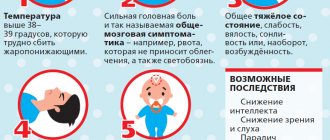10/08/2020 Reading time: 6 min 4000 0
A baby's first birthday is not only a joyful event. For many, this is also the beginning of a period that seems like a complete surprise. Until recently, the calm baby becomes capricious, becomes uncontrollable, screams and cries a lot. This does not mean that he is sick with something or that you did something wrong. Most likely, the child is having a 1-year-old crisis - a natural condition that needs to be given a little more attention. The more carefully and competently parents behave, the easier it will be for both the child and themselves to survive this difficult period.
The essence of the crisis
During the first year of life, a child travels a long way in development. Just 12 months ago he was a tiny, incompetent lump who was not aware of the surrounding reality. And at the age of one he already has some speech skills, he stands on his feet, plays with toys, and tries to walk. It is believed that the cause of the crisis is the stress that occurs in a child during the transition to a qualitatively new stage of development. Psychologists and developmental psychologists say that around the age of one, the infancy period ends, and the baby begins to separate himself from his parent [1]. This is, in particular, due to the fact that the child gets the opportunity to move independently. In addition, his psyche begins to form, his own motivation appears, the ability to express thoughts, desires and preferences arise - he begins to realize himself as an individual. It is difficult and unusual for the child, his worldview changes; reacting to this, he becomes restless.
How to deal with hysteria?
Let your child be independent
Never do for him what he can do himself. When choosing clothes, leisure activities, and menus, discuss possible options together and take his opinion into account. If the requirement is absurd or impossible to fulfill, explain clearly why this cannot be done.
Give up total control and allow your child to make his own mistakes. Gently point to them, show them how to do it right, but he must do the rest himself.
Causes
A crisis can occur in different ways depending on how the child lives, how actively the parents are involved with him, and how he eats. Some phenomena familiar to this age contribute especially strongly to the crisis state. This does not mean that they should be abandoned: the main thing is to approach the issue wisely and help the child successfully survive difficult times and adapt to the new world.
Change of diet.
New products appear on the child's menu. They are certainly healthy and tasty, but unusual. It's discouraging. Often at this same moment, women stop breastfeeding, which causes the baby to weaken the bond with his mother. He must get used to being independent, and this is quite difficult.
Lots of information.
A child at this age is constantly learning something: words, movements, skills in handling objects. Of course, this is not easy given the huge amount of unfamiliar information. In addition, each new skill or skill causes delight in the child and the realization that he is becoming independent, and parents do not always understand this independence. The baby is trying to gain new knowledge and new experiences.
Physical exercise.
In addition to the fact that the child thinks more and learns a lot, he also puts in a lot more effort than before. As a baby, he could lie in his crib all day, occasionally turning over or traveling in his mother’s arms. Now he has to strain his own muscles to crawl, try to walk, climb from the floor to the sofa and back. Awareness of one's own physical capabilities also provokes a crisis state. The child realizes that he is capable of doing a lot on his own, and therefore he wants to act independently as often as possible [3]. But the baby is not yet familiar with many aspects of the real world and does not understand why he is limited when he tries to do something interesting.
Building social connections.
During this same period, the child tries to build relationships with his parents in a new way. If previously the baby was in a state of merging with his mother, now he has to let her go and understand that he is an independent person. A new type of relationship with parents is being built: through joint activities, and substantive ones at that [2]. This means that the baby is trying to learn how to use familiar household objects by looking at adults and adopting their behavior. In addition, it is during this period that the child begins to understand that he needs to behave differently with different people. For example, you can ask your mother for food, but not your neighbor. With strangers he becomes distrustful, with family he becomes demanding [3]. This is how the child takes his first steps towards socialization and learns to form social connections.
Caprice as a message to parents
A whim is always a child’s message about discomfort, which he cannot express in an acceptable form. If a child is constantly capricious, and you have ruled out physical causes (diseases, fatigue), it is worth considering what state of mind he is in. Psychologists note that often a child’s inappropriate behavior is a reaction to intrafamily disharmony. The grandmother is dissatisfied with the way the young mother is raising the baby, she is constantly indignant and gives unsolicited advice. Or parents start quarreling every time the baby needs to be put to bed. Explicit or unspoken complaints and conflicts, a tense situation in the family, have the greatest impact on the child. In this case, his “whims” are the materialization of the discontent and irritation surrounding him. And the situation can be corrected only by improving family relationships.
Certain pedagogical violations in the family can also easily become a source of whims. If parents allow a child absolutely everything, and he simply does not understand the word “no,” any attempt at a ban leads him almost to hysterics. As a rule, parents are afraid of such a reaction and are ready to do anything to avoid its repetition, which means they continue to indulge the child. And this inevitably deepens discord in the family and makes its members even more irritable. The opposite situation can also involve the entire family in a vicious circle: they behave too strictly with the child and literally suppress all attempts at independent action and decision-making. The baby protests, the parents become even stricter with him. The same effect occurs if different family members adhere to diametrically opposed parenting styles - for example, the mother is very strict with the baby, and the father allows absolutely everything. All these situations are best discussed with a family psychologist.
How does the crisis of the first year of life manifest itself?
Each child is individual and different from the other, so no one can give an exact algorithm for his behavior in a crisis. There are only general signs by which you can notice the beginning of a difficult period. The main thing is to be aware of this possibility and not to be scared when a baby, calm a week ago, suddenly begins to behave completely differently. If the manifestations are strong, you can show the child to the doctor to calm the nerves, so as not to miss the symptoms of any disease. But usually a crisis is easy to distinguish from an illness: there are no somatic manifestations, the child is developing well and harmoniously, only character and behavior change.
Loud crying.
The first manifestation of a crisis is bright, expressed negative emotions in response to stimuli. The child begins to cry, and loudly, if something does not suit him. At the same time, tears don’t even necessarily flow. Crying may be accompanied by acts of aggression: the baby may lose his temper, throw a toy, stomp his foot, or try to break something. Usually the reason for such a cry is that the child wants something, but he was not given it, he is indignant and angry. Subsequently, the crying gives way to resentment and disappointment: the cry did not produce results, the baby did not get what he wanted. The offended child begins to cry again, but more quietly, and this time there are a lot of tears. The main thing is to understand: you shouldn’t indulge your baby’s every whim, it’s useless, and even harmful or dangerous.
Sudden movements.
Attacks of aggression, as already mentioned, are accompanied not only by screaming and tears, but also by movements. Children have very active facial expressions and gestures: this is one of their ways to express strong emotions. Therefore, the baby may begin to stomp his feet, wave his arms, and clench his fists. Some children may fall to the floor in hysterics and start rolling around on it. In such a situation, there is no need to immediately rush to give the baby what he wants. One of the conflicts of a child during a crisis is the need to understand the boundaries of what is permitted and to understand that there are things that are still prohibited for him. If you spoil your baby too much and give him everything he wants, you can make life more difficult for yourself and harm his development.
Lively facial expressions.
When a child doesn’t like something, he may frown and make an offended expression on his face. Children at one year of age already perfectly understand simple emotions and actively use them. Another sign of a crisis can be emotional instability: one moment the baby was laughing and happy, and suddenly he starts crying. During a crisis period, facial expressions become especially lively and even a little demonstrative. The kid frowns, compresses his lips, squints. Usually, with such facial expressions, he tries to show stubbornness, which begins to manifest itself especially strongly during the year.
Sleep disorders.
If previously the whole life of a child was subordinated to biological rhythms, now they cease to have their former meaning. The routine is still important for him, but now it is more difficult for the baby to follow it: this has to be done partly consciously, and not just at the behest of the biological clock. The structures of the brain change, the nervous system also changes to suit new age and new conditions. It may be difficult for a child to get used to this. In addition, purely physiologically, he needs less and less sleep, now he is awake for at least 4 hours, and during the day he only wants to sleep a couple of times. This may cause misunderstanding among parents who are accustomed to their child sleeping a lot and for a long time. And the child himself may experience stress due to such changes. Parents should create an optimal sleep schedule for their baby and maintain it.
Are children's tantrums dangerous?
It all depends on the symptoms that appear in the child during a tantrum.
As a rule, a baby who throws a tantrum begins to cry and scream loudly. This is also accompanied by chaotic movements of the arms and legs. Children clench their hands into fists and begin to stomp their feet. Such manifestations of hysteria are completely harmless and do not leave any consequences.
But, if a child falls into a strong hysteria, he may start swinging on the floor, hitting his head against a wall or floor, biting objects around him, and scratching. In severe cases, this can lead to seizures or difficulty breathing. After a severe tantrum, a child may experience nausea and headache.
If you know that your child is prone to such serious states, under no circumstances try to explain anything or prove your point of view during an attack. At this moment, your main task is to calm the child and bring him to his senses.
If your child experiences frequent and severe tantrums, after which he feels overwhelmed and lethargic, has nightmares, causeless nausea or instances of loss of consciousness, be sure to seek advice from specialists. In this case, assistance is provided by child psychologists, neurologists or psychotherapists.
It's hard to imagine, but often children's tantrums have a positive effect. Through hysterics, children get rid of accumulated grievances and negative emotions. A “correct” hysteria will help a child develop a strong psyche, normalize sleep, and learn to openly express their emotions.
Timing of the crisis
The concept of “first year crisis” is relative. For some it begins earlier, for others later, and for others it does not begin. Sometimes parents attribute the child's strange behavior to teething or poor health, but in reality the child is simply growing up and moving on to a new stage in life. The same applies to the timing of its completion: remember that each child is individual. Some things, of course, depend on the parents. It is not always possible to influence the timing, and it is completely impossible to cancel the crisis. All that is required of them is to create an atmosphere of love and care for the child, understand what is going on in his head, and try to smooth out the discomfort for the baby and parents. Despite all the desire for independence, during a crisis period, the support of mom and dad is very important for a child.
When does it start.
Nobody can give exact dates. For some, the crisis manifests itself already at 8–9 months, while other children begin to behave differently closer to their birthday, or even after it. The criterion by which one can assume the imminent onset of a crisis is often the ability to move independently [3]. You can check a calendar or table of crisis periods in children, but most often parents learn about the onset of a crisis by its signs. These are changes in the baby's behavior:
- increased desire for independence;
- abandonment of usual rituals, change of tastes;
- stubbornness and capriciousness, mood swings;
- instability of desires, including in relation to parents. A child may simultaneously try to hug his mother and move away from her - this is how the crisis of separation manifests itself;
- jealousy towards other family members.
How long does it last?
Sometimes they say that the beginning of a crisis can be calculated and tracked by the appearance of two marker words in a child’s vocabulary: “give” and “no” [3]. They begin to repeat themselves especially often in his speech. But with the end of a difficult period, it becomes more and more difficult. The duration of the crisis of the first year is individual and ranges from 1 month to a whole year. There is an opinion that the peak of the crisis occurs at 8–15 months of life, then it declines. The opposite opinion says that the crisis situation lasts for a whole year, now intensifying and now weakening. There is still no consensus on this matter, but remember: the baby develops at his own pace. This pace cannot be influenced, but you can make sure that the crisis passes easily and smooth out its manifestations. Then the most acute period will be stopped quickly, and the child will not have injuries that affect his future life.
Key symptoms of the crisis: 7 major changes
To one degree or another, the manifestations have similar features in all children; only the severity of the key characteristics of the 3-year-old crisis differs. Parents describe common manifestations as changes in behavior and disobedience, scandals and hysterics, tears literally over every little thing. Psychologists identify 7 main symptoms of crisis behavior:
- Negativism . The child flatly refuses to follow the instructions of adults, even if this request is beneficial to the child himself. To any requests - a clear “no”.
- Obstinacy . The baby suddenly changes his habits and does not want to adhere to the regime. Through scandals and hysterics, he tries to win the right to do as he wants.
- Stubbornness . The child makes a decision and strictly adheres to this line. It is impossible to force, persuade or motivate him to do certain habitual actions. He will cry, but clearly stand his ground.
- Self-will . The baby wants to do things on his own, ignoring the parents' prompts or words.
- Protest . The peculiarities of this characteristic are a storm of emotions in relation to his parents’ instructions about what he should do. If parents have chosen or decided something for him, the child refuses these things or actions.
- Depreciation . The baby stops appreciating those things or actions that were previously important, loved or dear to him. He may throw and break his favorite toys, call his parents names, fight with his brothers and sisters, and refuse his favorite treats.
- Despotism . The child tries to command family members, demands submission and unquestioning obedience. If his whims are not fulfilled, hysterics and screams follow, stamping his feet and raising his voice. Source: D.M. Shakirova, A.F. Gilmanova. Age crises in children of preschool and school age // Skif. Student Science Questions, 2021.
Not all of these signs may manifest themselves equally clearly; sometimes certain symptoms predominate, which are triggered most often and which the child uses as an instrument of influence.
Recommendations for parents
- Give the baby more independence. Freedom of movement, helping parents with simple things - allow this to children, this is how they explore the world.
- Provide a safe environment for exploration and movement, so that a curious baby does not reach into the outlet or into the toilet.
- Avoid permissiveness. The child does not yet know the boundaries and rules of the real world. It is important to stop it in time, but not too abruptly. There is no need to bribe your baby with toys and sweets: this way he will quickly learn to manipulate. It is possible to prohibit doing something, but this must be justified, and not pressured by authority.
- Do not be rude or aggressive with your child. Constantly pulling your child down, even for harmless reasons, is not only useless, but also harmful to his psyche.
- Monitor your own behavior. Children copy a lot from their parents, whether they want it or not.
- Distract a naughty child. This could be a toy or a shared activity.
Content
- Essence and features
- Causes
- Symptoms of crisis in a 7 year old child
- Duration
- How to cope: advice to parents from psychologists
- Consequences
Each leap in physical and psychological growth in children is accompanied by a special transition period - a crisis.
At seven years old, the child reaches the next stage of development. A preschooler becomes a schoolchild, and his social status changes. New responsibilities appear, adults begin to make other demands, and the daily routine becomes different. The psyche experiences a shock, which is accompanied by worries, a change in habitual behavior, and difficulties with communication. Therefore, in developmental psychology, children have a crisis of 7 years. When games change to active learning, the social circle changes and a different social role is formed, the child becomes disobedient, stubborn, and irritable. Signs of a mental crisis can appear between the ages of five and eight years. To help correctly overcome this difficult stage and take a new social position, parents must recognize the crisis in time and respond to it correctly.
Is it possible to avoid a crisis?
No. Most likely, the crisis situation will make itself felt one way or another. There is no need to be scared or angry with the child: it is not his fault, he is just trying to understand himself in the big world. Remember this. Trying to avoid a crisis will likely only make things worse. If this stage is not passed and completed at the appropriate age, it can later result in injuries and other, more serious problems. Try to quickly accept the changed conditions and adapt to them. For example, games of hide-and-seek or catch-up can help a child cope with the conflict of separation from his mother [3]. In this way, he separates, and nevertheless remains next to her, because sooner or later the mother catches up or finds the baby.
Recommendations for preventing hysterics from experts
- Create a clear daily routine, stick to it every day and with the whole family, repeating actions in a certain order. If changes are planned in the daily routine, they should not be spontaneous for the child; the child should be told about this. This will prepare him for the changes.
- A separate point about sleep. There should be enough time for it, and there must be a day’s rest.
- Develop a clear system of rules, restrictions and prohibitions that applies to the child regardless of what day it is, where and with which family member he is.
- Do not overload the child’s nervous system, try not to saturate his day with too many bright emotions and impressions - a little of each good thing.
- Talk to your doctor about special magnesium and vitamin C supplements for children (usually in gummy form). Magnesium will help strengthen the baby's nervous system. Consultation with a specialist in this matter is required.
- If you see that the child's indignation is already close, try to distract him to avoid hysterics.











